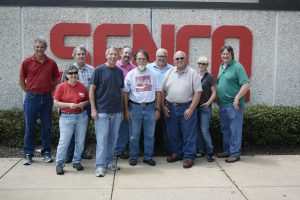We may receive a commission when you use our affiliate links. However, this does not impact our recommendations.
 Last month the entire staff of Popular Woodworking Magazine (PWM) trekked off to Senco‘s manufacturing facility to take a tour with four of the five grand prize winners from our Senco Event held in the PWM shop in the Spring. The guy who missed the tour gave some lame excuse about his wife having a baby.
Last month the entire staff of Popular Woodworking Magazine (PWM) trekked off to Senco‘s manufacturing facility to take a tour with four of the five grand prize winners from our Senco Event held in the PWM shop in the Spring. The guy who missed the tour gave some lame excuse about his wife having a baby.
Senco manufactures most of their nails and staples right here in Cincinnati – and the factory is cool in the extreme. Our guide, Steve, has worked for Senco for more than 20 years and seemed to be fully versed in every manufacturing process in the place.
 We started right at the beginning of the process – where the raw materials enter the plant and are stored until they’re needed. What you see in the picture is a few days worth of material. Senco produces tens of millions of nails per month and more than one hundred million staples. If that’s not amazing enough, we saw only a couple of dozen employees working on the production lines. Automation is definitely a key word at Senco.
We started right at the beginning of the process – where the raw materials enter the plant and are stored until they’re needed. What you see in the picture is a few days worth of material. Senco produces tens of millions of nails per month and more than one hundred million staples. If that’s not amazing enough, we saw only a couple of dozen employees working on the production lines. Automation is definitely a key word at Senco.
The prize winners from the event got an insider’s view of the effort and quality the employees at Senco put into their products. For nails, the process begins with the raw wire. The spools of heavy gauge wire are threaded onto machines that work the wire down to thinner gauges. It was amazing to see nearly 1/4″ thick wire being worked down to 18 gauge all in space of about 50′.


Once the wire is thinned down to the proper gauge, nails are made by the thousands. They’re made individually and then bonded together with either glue or some form of paper tape, depending on which product is being made. On the tour, we saw primarily common nails being made, but Senco manufactures finish nails and pins as well.
Although I’m not personally much of a staple user when it comes to woodworking, the process of making them was interesting for all to see. The wire is drawn through the machines, folded into shape, glued and heated to set the glue, and cooled and boxed all within about a 15′ to 20′ space. Senco manufactures standard staples that fit their own staplers as well as from many other companies. But that’s not all they manufacture – they also make specialty fasteners for mitered corners and tiny clamp-like staples for the casket industry (as well as other specialty fasteners for all kinds of other industries). Once all the fasteners are boxed and stored right onsite until they are shipped to their destination anywhere in the world.
I want to thank Bethany Ritchey and all the folks at Senco for not only coming out to the PWM shop for the event and providing a host of incredible prizes, but for so graciously allowing the staff of the magazine and a select group of readers into their home to see how things are made. I also want to thank Rob Foster of Freeman Communications for getting this whole adventure started and keeping it all on track throughout.
I’ve been using Senco nailers and pinners for more than 30 years. In fact, I still have my first 18 gauge Senco pinner (an LS2) that works like the day it was made. Their products are top notch from guns to nails to compressors, the quality shines through. The fact that they still make so much of their product line here in the US (and more specifically here in Cincinnati) is something to be admired and patronized.
Here are some supplies and tools we find essential in our everyday work around the shop. We may receive a commission from sales referred by our links; however, we have carefully selected these products for their usefulness and quality.
















